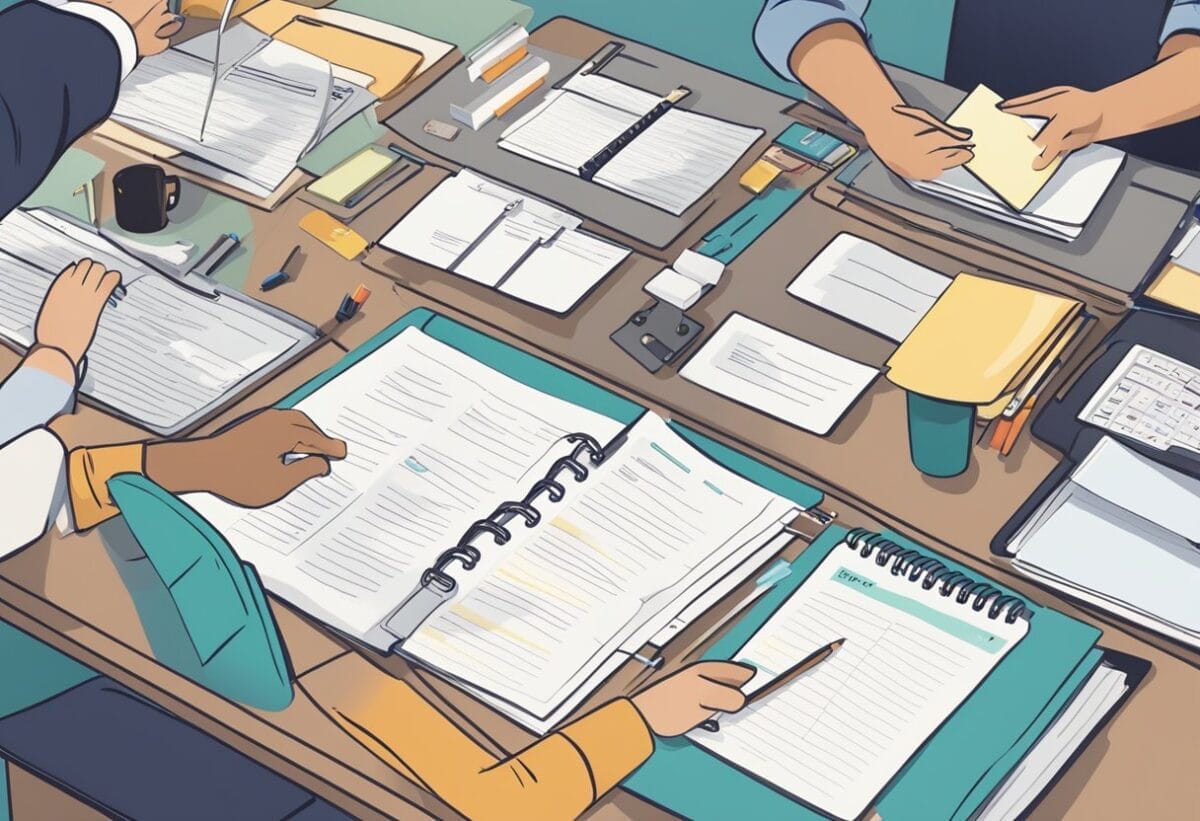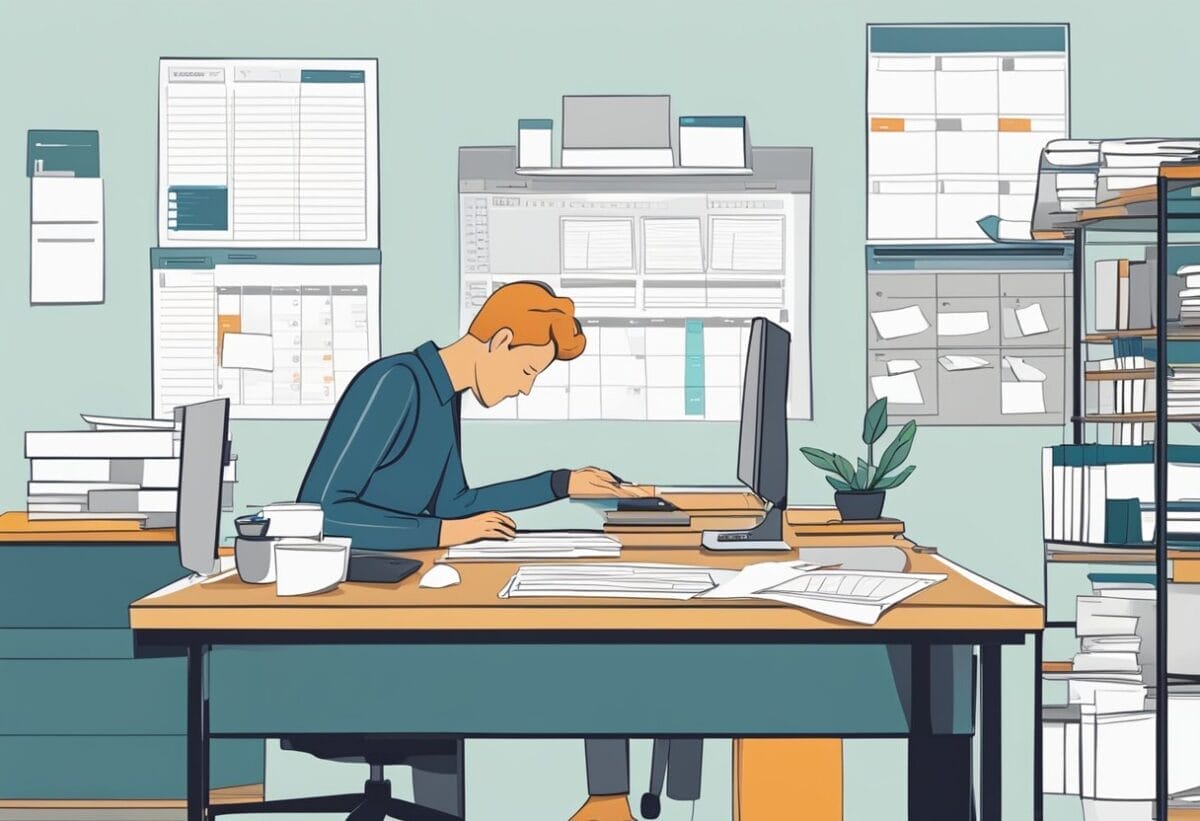When answering job interview questions such as “How do you handle important projects?”, it often trips up candidates. But with the right approach, you can ace this common interview question. By preparing a strong response, you’ll impress your interviewer and boost your chances of landing the job.
Your answer to this question shows employers how you manage tasks and work under pressure.
Think about times you’ve successfully managed big projects. Be ready to share specific examples that showcase your abilities.
Key Takeaways
- Prepare examples of successful projects you’ve managed
- Highlight your organization, leadership, and problem-solving skills
- Practice your response to feel confident during the interview
Why Do Employers Ask “How Do You Handle Important Projects?” During an Interview
Employers want to know if you can handle big tasks. They ask this to see how you work under pressure. Your answer shows if you’re a good fit for the job. They also want to see if you can lead. Big projects often need teamwork. Your answer can show if you work well with others.
This question lets them check your skills.
- Can you plan well?
- Do you meet deadlines?
- How do you solve problems?
Your reply gives them clues about these things and your past success matters too. If you’ve done well before, you might do well again. Employers like to hear about your wins.
They’re looking for someone reliable.
- Can they trust you with important work?
- Will you be doing a good job at their company?
- What is your workflow?
Your answer helps them decide and this question also shows how you think.
- Do you stay calm when things get tough?
- Can you adapt to changes?
They want to picture you in the role and these are key traits employers value. Your answer helps them see if you’d do well in their company.
Common Variations Of “How Do You Handle Important Projects?”

You might encounter different versions of this question in your interview. Here are some common variations:
- “Tell me about a time you managed a complex project.”
- “How do you prioritize tasks for important projects?”
- “What’s your approach to meeting project deadlines?”
- “Can you describe your project management style?”
Interviewers may also ask about specific aspects of project handling:
- “How do you delegate tasks in a team project?”
- “What tools do you use to track project progress?”
- “How do you handle setbacks or obstacles in a project?”
Be ready to discuss your experience with:
- Planning and organizing
- Time management
- Team collaboration
- Problem-solving
- Adapting to changes
These questions aim to understand your skills in, leadership, organization, communication and decision-making.
Prepare some examples from your past work or school projects. Think about times you successfully completed important tasks. Be ready to explain your methods and the results you achieved.
How To Answer “How Do You Handle Important Projects?”

Handling important projects is a key skill employers look for. Here’s a step-by-step approach to ace this interview question.
Step 1: Start by showing you understand the project’s importance
Mention that you’d first review the project goals and deadlines. Say you’d break down the project into smaller, manageable tasks. This shows you’re organized and can see the big picture.
Make a list of key stakeholders and resources needed. Explain that you’d set up a meeting to discuss roles and expectations. This proves you value teamwork and communication.
Step 2: Talk about how you’d create a detailed project plan
Include milestones, deadlines, and task assignments. Mention using project management tools like Trello or Asana. This shows you’re tech-savvy and can keep projects on track.
Explain that you’d set up regular check-ins with team members. Say you’d use these to track progress and address any issues. This proves you’re proactive and stay on top of things.
Step 3: Discuss how you’d manage risks and solve problems
Say you’d make a list of possible issues that could come up. Explain that you’d have backup plans ready for each one. This shows you think ahead and can handle challenges.
Talk about how you’d stay flexible and adjust plans if needed. Give an example of a time you solved a problem in a past project. This proves you can think on your feet and learn from experience.
Step 4: Highlight your communication skills
Explain how you’d keep everyone in the loop. Say you’d send regular updates to team members and bosses. Mention that you’d use clear, simple language to explain complex ideas.
Talk about how you’d listen to feedback and concerns from others. Say you’d address these quickly to keep the project moving. This shows you’re a team player who values input from others.
Step 5: Wrap up by talking about how you’d finish the project strong
Say you’d do a final check to make sure all goals were met. Mention that you’d get feedback from the team and stakeholders.
Explain that you’d document lessons learned for future projects. Talk about how you’d celebrate the team’s success. This shows you care about quality and appreciate your coworkers’ efforts.
Best Example Answers To “How Do You Handle Important Projects?”

Crafting a strong response to this interview question shows your ability to manage tasks and deliver results. These examples highlight key skills like planning, communication, and problem-solving.
Example Answer For A Recent Graduate
“I break big projects into smaller, manageable steps. First, I create a timeline with clear milestones. Then I prioritize tasks and set deadlines for each one. I use tools like calendars and to-do lists to stay organized.
Communication is key. I keep team members updated on progress and ask for help when needed. If obstacles come up, I tackle them head-on. I look for creative solutions and learn from any setbacks.
Regular check-ins help me stay on track. I review my progress often and adjust my plan if needed. This approach helped me complete my senior thesis on time and earn high marks.”
Example Answer For An Experienced Candidate
“I start by clearly defining the project’s goals and scope. Then I create a detailed project plan with tasks, timelines, and resource needs. I use project management software to track progress and keep everyone aligned.
Clear communication is crucial. I hold regular team meetings and send updates to stakeholders. When issues arise, I address them quickly. I look at root causes and work with the team to find solutions.
I’m always looking for ways to improve efficiency. On my last project, we streamlined our approval process, saving two weeks on delivery. By staying focused and adapting as needed, we completed the project under budget and ahead of schedule.”
Example Answer For A Leadership Position
“My approach centers on empowering the team while keeping the project on track. I start by setting clear expectations and goals. Then I work with team members to create a detailed project plan.
I delegate tasks based on each person’s strengths. Regular check-ins help me monitor progress and provide support where needed. I encourage open communication and create a space where team members feel comfortable sharing ideas or concerns.
When challenges arise, I guide the team in finding solutions. We look at data, brainstorm options, and choose the best path forward. This approach helped us turn around a struggling product launch last year, resulting in a successful release and positive customer feedback.”
Example Answer For An Industry Change
“I apply my project management skills from my previous industry while learning the specifics of this new field. I start by researching industry best practices and consulting with experienced colleagues.
I create a detailed project plan, breaking down tasks and setting realistic timelines. I use familiar tools like Gantt charts and project management software to keep everything organized.
Clear communication is key, especially when learning a new industry. I ask questions, seek feedback, and keep all stakeholders informed. When faced with unfamiliar challenges, I’m not afraid to ask for help or guidance.
This approach helped me successfully manage a complex IT project in my new role, despite my background being in finance.”
Example Answer For A Career Change
“I leverage my transferable skills while embracing new industry knowledge. I start by clearly defining project goals and expectations. Then I create a detailed plan, breaking the project into manageable steps.
I use my strong communication skills to keep team members and stakeholders informed. Regular updates and check-ins help ensure everyone is on the same page.
When faced with new challenges, I’m eager to learn. I seek out resources, ask questions, and collaborate with experienced colleagues. This helped me successfully manage a marketing campaign in my new role, drawing on my problem-solving skills from my previous career in teaching.”
Join over 11,000+ achievers who are committed to achieving their career goals!

![100+ Best Soft Skills to Put on Resume [According to Statistics] 4 List of The Best Soft Skills For Resume At Work](https://hqhire.com/wp-content/uploads/2022/08/List-of-The-Best-Soft-Skills-For-Resume-At-Work-768x402.jpg)




